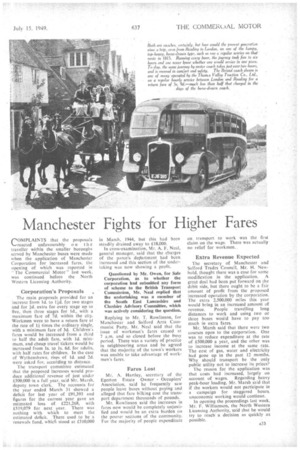Manchester Fights for Higher Fares
Page 23

If you've noticed an error in this article please click here to report it so we can fix it.
COMPLAINTS that the proposals %---reacted unfavourably o n the traveller within the smaller boroughs served by Manchester buses were made when the application of Manchester Corporation for increased fares, the opening of which was. reported in
The Commercial Motor" last week, was continued before the North Western Licensing Authority.
Corporation's Proposals The main proposals provided for an increase from Id. to lid. for two stages and for id. extra for every stage up to five, then three stages for id., with a maximum fare of 7d. within the city. Workmen were to have a retu-rn fare at the rate of 0 times the ordinary single, with a minimum fare of 3d. Children's fares would be increased from a third to half the adult fare, with Id. minimum, and cheap travel tickets would be increased from Is. to Is. 6d. for adults, with half rates for children. In the case of Wythenshawe, rises of Id. and 2d. were asked for, according to distance.
The transport committee estimated that the proposed increases would produce additional revenueof just under £500,000 in a full year, said Mr. Marsh, deputy town clerk. The accounts for the year ended March 31 showed a deficit for last year of E91,393 and figures for the current . year gave an estimated loss of £221,268, with £519,079 for next year. There was nothing with which to meet the estimated deficit. There used to be a renewals fund, whicli stood at £310,000 in March, 1944, but this had been steadily drained away In £18,000.
In cross-examination, Mr. A. F. Neal, general manager, said that the charges of the parcels department had been increased and this section of the undertaking was now showing a profit.
Questioned by Mr. Owen, for Sale Corporation, as to whether the corporation had submitted any form of scheme to the British Transport Commission, Mr. Neal replied that the undertaking was a member of the South East Lancashire and Cheshire Advisory Committee, which was actively considering the question.
Replying to Mr. T. Rowlinson. for Manchester and Salford Area Communist Party, Mr, Neal said that the issue of workman's fares ceased at 7 a.m. and so closed before the busy period. There was a variety of practice in neighbouring areas and he agreed that the majority, of the town's workers was unable to take .advantage of workmen's fares.
Fares Lost
Mr. A. Hartley, secretary of the Egerton Estate Owner Occupiers' Association, said he frequently saw people leave buses without paying and alleged that fare bilking cost the transport department thousands of pounds.
Mr. Rowlinson said the increases in fares now would be completely unjustified and would be an extra burden on the poorer sections of the community. For the majority of people expenditure on. transport to work was the first claim on the wage. There was actually no relief for workmen.,
Extra Revenue Expected
The secretary of Manchester and Salford Trades Council, Mr. H. Newbold, thought there was a case for some modification in the application. A great deal had been put forward on the debit side, but there ought to be a fitir amount of profit from the proposed increased operation by the corporation. The extra 2,500,000 miles this year would bringin an increased amount of revenue. People travelling long distances to work and using two or three buses would have to pay too much in extra fares.
Mr. Marsh said that there were two courses open to the corporation. One was to reduce expenditure at the rate of £500,000 a year, and the other was to increase income at the same rate. The cost of gas, water and electricity had gone up in the past 12 months. Why should transport be the only public utility not to increase its prices? The reason for the application was that costs had increased, largely on account of wages. Regarding heavy peak-hour loading, Mr. Marsh said that if the workers would not participate in a campaign for staggered hours, uneconomic working would continue.
In opening the proceedings last week, Mr. F. Williamson, the North Western Licensing Authority, said that he would try to reacha decision as quiekly as possible.


























